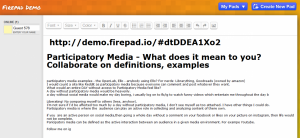Today we discussed copyright and fair use and used the copyright slider to determine if particular works were protected by copyright or in the public domain. Next time we’ll start with a quick overview of open access. We’ll spend most of our time Wednesday talking about privacy, how the definition is evolving, and challenges presented by networked digital media. Please read the following:
Price, Big Data and Privacy
Rainey & Anderson, The Future of Privacy
Wu, Why Monopolies Make Spying Easier
Your blogging assignment is to comment on at least one and no more than three blog posts. Be sure your comments total at least 100 words. To comment on a classmate’s post, click on the Leave a Reply link at the top of the post, type your comment, and click Post Comment when you’re finished. More help with comments on the OpenLab is available here.
~Prof. Leonard



